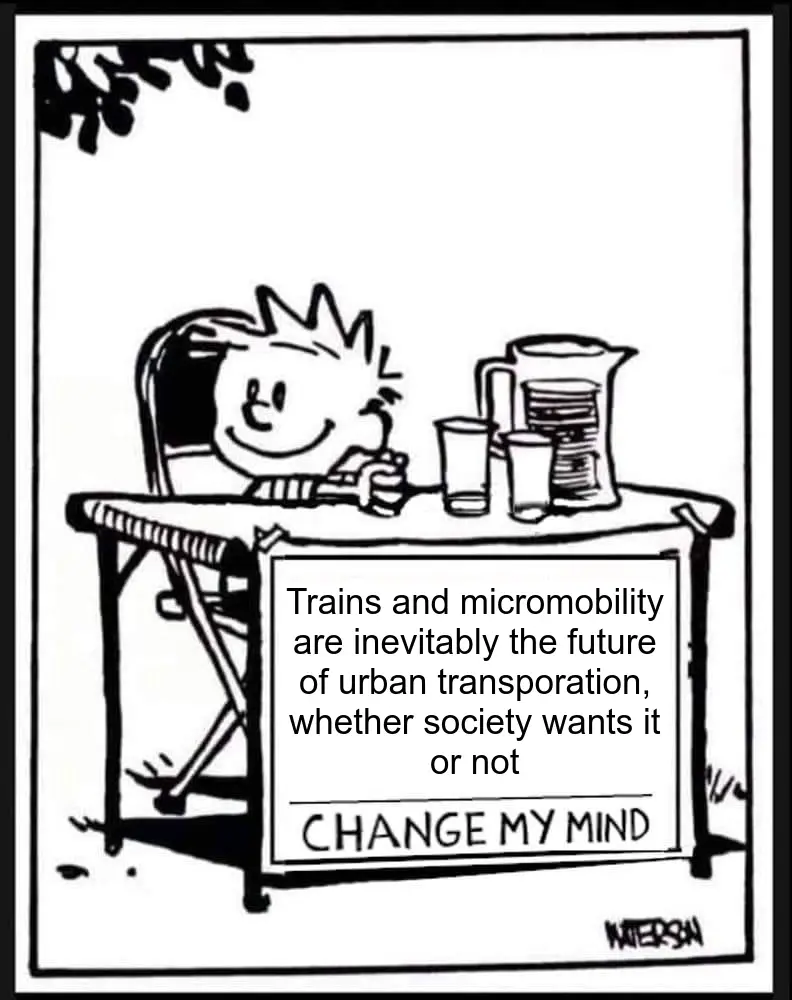Well in the UK, considering that a return ticket to London for commuting hours costs me £140, no, it is not the future here. I could drive most of the way from home into London, pay the ULEZ charge, park in an expensive train station car park and get a short distance train for a third of that, including fuel.
Fuck Cars
A place to discuss problems of car centric infrastructure or how it hurts us all. Let's explore the bad world of Cars!
Rules
1. Be Civil
You may not agree on ideas, but please do not be needlessly rude or insulting to other people in this community.
2. No hate speech
Don't discriminate or disparage people on the basis of sex, gender, race, ethnicity, nationality, religion, or sexuality.
3. Don't harass people
Don't follow people you disagree with into multiple threads or into PMs to insult, disparage, or otherwise attack them. And certainly don't doxx any non-public figures.
4. Stay on topic
This community is about cars, their externalities in society, car-dependency, and solutions to these.
5. No reposts
Do not repost content that has already been posted in this community.
Moderator discretion will be used to judge reports with regard to the above rules.
Posting Guidelines
In the absence of a flair system on lemmy yet, let’s try to make it easier to scan through posts by type in here by using tags:
- [meta] for discussions/suggestions about this community itself
- [article] for news articles
- [blog] for any blog-style content
- [video] for video resources
- [academic] for academic studies and sources
- [discussion] for text post questions, rants, and/or discussions
- [meme] for memes
- [image] for any non-meme images
- [misc] for anything that doesn’t fall cleanly into any of the other categories
Recommended communities:
But that's an issue with capitalism, not the technology itself. Roads and high(motor)ways are very heavily subsidized and tax funded, while rail in the UK is largely privatized. It's just a sign of what is being prioritized by government and/or society, which is cars in this case. There are plenty of places where public transit is free or at least the definitive cheapest way to travel, also due to government funding.
In Europe ( i mean Paris, France and Italy ) public authority had pushed hard on micromobility, but now they are, in reality banning it cause safety problems.
It's funny because trains are both the past and the future.
At one point you just can't move all these people where they need to be in individual tin cans that seat four but mostly hold one.
Also, trains and light rail have already been automated. The tech is already here.
I wonder how a train is picking up my walking disabled mother from three Kilometres afar?
Will a train stop at my house to pick up my some two tons of gardening scraps per year?
At which time will it deliver my 100kg of groceries per week?
Do you run an orphanage?
I rented a car with adaptive cruise controle a month ago and it felt like riding a train. Driverles cars could work if they aren't personal possession.
Trains are great but people want their own personal bubble and don't want to stand around outside waiting for a train especially since the timetable is out of their control
This is key. Urban planners and environment folks focus so much on their respective fields and don't consider dignity enough. Of course we'd all like cheap, fast, sustainable transportation, but not if that means being packed into bench seating, plagued with delays, and sometimes even risk our safety due to other passengers. Trains don't have to be bad, but the penny-pinching planners often ruin the experience.
Quite frankly as an American, I think it's very American to even consider the timetable as out of your control. For a lot of places, the trains come so fast that you're not even waiting for a few minutes - like most drivers take longer to get settled into their car seat before driving. The sorry state of American transit is absolutely not the pinnacle of transit.
It's the best thing for the future, that doesn't mean it's inevitably the future
